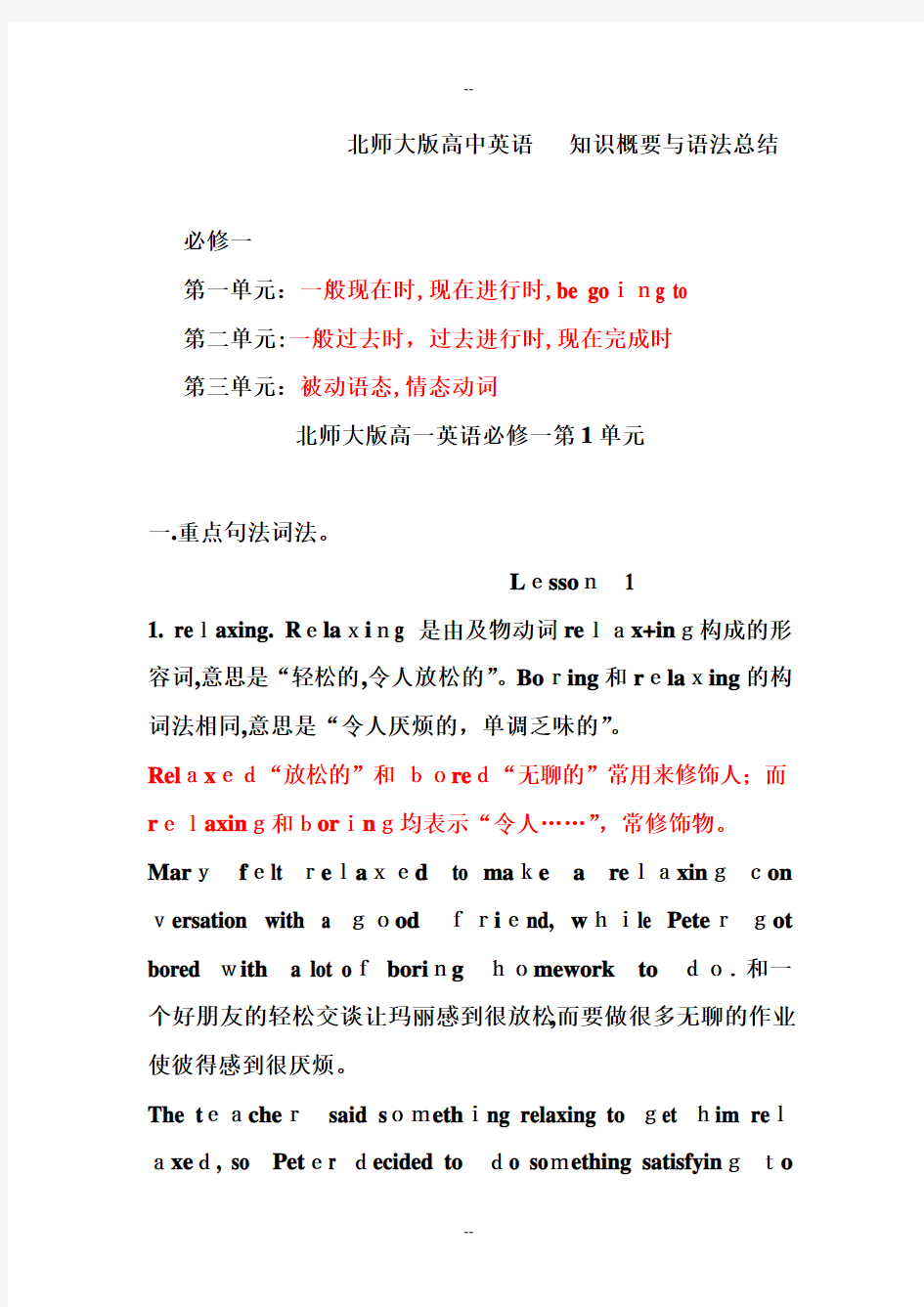

北师大版高中英语知识概要与语法总结
必修一
第一单元:一般现在时,现在进行时,be going to
第二单元:一般过去时,过去进行时,现在完成时
第三单元:被动语态,情态动词
北师大版高一英语必修一第1单元
一.重点句法词法。
Lesson 1
1. relaxing. Relaxing 是由及物动词relax+ing构成的形容词,意思是“轻松的,令人放松的”。Boring和relaxing的构词法相同,意思是“令人厌烦的,单调乏味的”。
Relaxed“放松的”和bored“无聊的”常用来修饰人;而relaxing和boring均表示“令人……”,常修饰物。
Maryfelt relaxed to make a relaxingcon versation with a goodfriend, while Petergot bored with a lot ofboringhomework todo.和一个好朋友的轻松交谈让玛丽感到很放松,而要做很多无聊的作业使彼得感到很厌烦。
The teachersaid something relaxing to get him relaxed, so Peter decided todo something satisfyingto
makethe tacher satisfied.老师对他说了一些让人放松的事情使他放松,于是彼得决定做点儿令人满意的事情让老师满意。
2.suppose(认为,猜想)的用法。
(1)suppose+that从句,表示“猜测,假定”。
I suppose that you areright.. 我想你是对的。
(2)supose+名词/代词+tobe…表示“认为……是……”
Many people suppose himto be over50.许多人认为他已经50多岁了。
(3)suppose/supposing作“假定,设想”讲,相当于连词if.Suppose you are wrong,what will you dothen?假如你错了,你将会怎样做呢?
(4)besupposedto“被期望做……,应该做……”表示劝告、建议、义务、责任等,相当于情态动词should.
AmI supposedto clean all therooms orjust th isone?我是应该打扫所有房间呢还是只这一间?
They were supposedto behereanhourago.
(5)用于简略答语中。
-Doyou thinkwe’ll have good weatherthisweekend? 你认为周末天气会好吗?
-I suppose so/not.我想会吧/我想不会。
5.Imagine.
(1)imaging sb. Doing sth. 想象某人做某事
I just can imagine him saying that! 我确实能想象到他那么说!
(3)imagine sb./sth.(to be)认为某人/某事……
Don’timagine your husband to bealways wron g.
(4)imagine+that从句想象,误认为
Your can’t imagine heshould makesuch amistake.你不到他竟然犯了这样的错误。
6.forty-three-year-old是复合形容词,作定语,其中ye ar不能用复数。
7.until到……(时间、地点)为止
He stayedhere until twelve o’clock.他在这里一直待到十二点。
Until还可以作连词。not…until…意思是“直到……才……”He will notgive youany answer untilhe has thought it over. 他对此事仔细考虑之后才会给你答复。
8.与“开、关”有关的词
(1)open/close/shut与door, window, box, book,eyes 等连用
(2)switch on/off多与radio,TV,light, computer等连用(3)turn on/off比switch on/off更通俗,多与radio,gas, wa ter等连用。
9.while引导时间状语从句,意思是“当……的时候,与……同时”,表示两个动作同时进行或两种状态同时存在。
He wasstill studying while the otherswere sleeping.
While还可以表示“然而、却”,连接两个并列句,含有对比的意味。
Many people trytheir best to help the homeless whilesomejust stand by.
很多人尽力于帮助那些无家可归的人,而有些人只是袖手旁观。
12.It takes sb. Sometimeto do sth.
It takes some time forsb.To do sth.
这两个句型是固定句型,意思是“某人花费多少时间做某事”
13.“get+过去分词”构成系表结构,通常强调动作的发生,也可指状态的变化。此类结构还有:
get lost迷路
getdressed穿衣
get hurt 受伤
get paid得到报酬
get married结婚
14.动词不定式作后置定语。当被修饰的名词或代词有序数词、形容词最高级或next, lastonly等限定词时,要使用动词不定式作定语。
Iamalwaysthe firstperson to get to the o ffice. 我总是第一个到办公室。
Miss Brown isthe last person to rise tospeak.布朗小姐是最后一个站起来发言的人。
15.be filled with充满着,相当于be fullof
fill…upwith用……装满,填满
fill in填写;度过(时光)
16.so+形容词或副词+that…引导结果状语从句,意思是“如此……以至于……”
(1)so that=inorder that
Heworks very hard sothat hecan buy his own apartment.他努力工作,为的是能买一套自己的公寓。(2)such…that作“如此……以至于”讲,连接一个表示结果的状语从句。
Hewas suchanhonest man thathe was praised bythe teacher.他非常诚实,因而受到了老师的表扬。
注意:如果后边的名词前由many, much,few,little等词修饰的话,则不用such而用so.
https://www.doczj.com/doc/c34462489.html,plainto sb.about/of sth. 向某人抱怨/诉苦……
complain about sth.to sb.向某人抱怨某事
She is always complaining about something. 她总是满腹牢骚
Lesson 2
2.stress
lay/place/put stress on 把重点放在……上
3.takeplace与happen, occur的用法区别
take place:指按计划、安排“发生”;“举行,进行”,相当于hold
happen:指偶然、意外的“发生”;“碰巧”,后面接动词不定式occur作“发生”解,一般可与happen互换。Occur还表示“想起、想到”
It happenedthat the driver was hiscousin. 那位司机碰巧是他的表弟。
Whenwill thebasketball game take place? 篮球赛何时举行?
Theidea occurred to him in a dream.
5.reduce…to表示“减少到……”;其中介词to表示“减少后的结果”
reduce…by表示“减少了……”;其中介词by表示“减少的程度或幅度”
7.prefer sth./doing sth.更喜欢……
Prefer todo sth.. 宁愿做某事
Prefersth./doing sth. to sth./doing sth.宁愿……而不愿……
Prefer sb.Todo sth.. 宁愿某人做某事
Prefer to dosth.rather than do 宁愿……而不愿……
Lesson 3
1.volunteer作动词,表“自愿去做”常跟to do 不定式Theyoung man volunteered tohelp theoldman.那个年轻人主动去帮助那位老年人。
2.pay attention to…注意,留心,重视,
Draw/attract one’s attetion(to)引起某人的注意;使某人注意……
Lesson 4
2.有关make sure的短语
(1) make sure that+宾语从句
注意:make sure 后面常接that引导的宾语从句,后接名词时需加介词of/about一般不用不定式,没有make suretodo sth.的句型。
(2) b e sureto do sth.务必/一定会做某事
(3) be sure of/about…be sure that+从句,表示肯定……,对……有把握
3.especially, specialy, particularly
especially:意为“尤其、特别地”。用来加强语气,常用在所强调的主语、介词短语、形容词、副词及状语从句前。
specially:意这“特意的,专门地”。强调不广泛,是专门为某一目的而进行的特地行为。
Particularly:=inparticular“特别的,尤其”;表过某事不寻常、过分或特别重要。常用于修饰名词、介词短语。
6.as aresult因此,结果
As a resultof +n./pron.由于……
7.comeup with 提出,想出(计划、主意等)Come across偶然遇到
Come about发生,产生
Come out发行;
Come true成真,变成现实
9.“主语+be+said/thought/believed/supposed等+动词不定式”句型表示“据说,人们说……”,相当于”It is/was+said/thought/believed/supposed等+that从句”
Itis saidthat Sydneyis beautiful.
10.makea difference:有关系,有影响
二.语法
1.一般现在时
构成和句式:
肯定式:主语+do/does或be(me/is/are)+其他
否定式:主语+do/does+not或be(me/is/are)+not+其他
疑问式:Do/Does或Be(am/is/are)+主语+其他
用法:
(1)表示现在发生的动作或存在的状态。
You look good in this new suit.
(2)表示经常性,习惯性的动作或存在的状态。常与usually,often, always, every day, sometimes,once amonth,never等连用。
I oftenfeel cold at this time of year.
(3)表示普遍真理和客观存在的事实。
But it is spring now. It is warm inspring.
(4)表示计划、安排好的将来动作。常用表示位置转移的动词。如go,come,arrive,leave,start,begin等。
Thetrain leaves a3:30p.m.
(5)在时间或条件状语从句中,用一般现在时代替一般将来时。We’llgo tothe park if itdoes not rain
tomorrow.
2.现在进行时
构成和句式:
肯定式:主语+ be(me/is/are)+doing+其他
否定式:主语+ be(me/is/are)not+doing+其他
疑问式:be(me/is/are)+主语+doing+其他
用法:
(1)表示正在时行的动作。
Peter,what are you doingthere?
(2)表示现阶段正在进行而此刻不一定进行的动作。
We are studying Spanishthis semester.
(3)表示将要发生的动作, 一般跟时间状语,表明动作发生的时间。常见的动词有arrive, begin,come, go, leave,start,stay等。
He is leaving for London next week.
(4)表示发展中或正在改变的情况
The weatheris gettingcolder andcolder.
(5)现在进行时可与always,forever, continually, constantly等副词喧嚣用,表示反复出现的或习惯性的动作,含有抱怨、赞叹、厌倦等感情色彩。
He is always changing hismind.
(6)用于动词hope,want, 和wonder等,表示一种比一般现在时态更委婉的证据。
I am wonderingif you can lend me your bike.
3.一般将来时
构成及用法:
(1)“will+动词原形”,常用来表示将来存在的状态、将要发生的动作;还可表示一种没有经过仔细考虑的主观意图,可能是在说的当时才作出的决定。
It will be my birthday in two days.
I will buy youanew car foryour birthday. (2)“begoing to+动词原形”:可以表示近期的打算,常用来表示事先已经决定或安排要做的事,常译为“准备做……”或“打算做……”;还可以表示“有迹象表明或预示着……”。
Howareyou goingtospend your weekend? (3)现在进行时表示将来:现在进行时往往表示计划好或准备要做的事。若用一些表示位置转移的终止性动词,如go,come,l eave, start,begin,take等,则表示马上要做某事。
I’mtaking the kidsto the zoo this Sunday. (4)一般现在时表示将来:主要指严格按昭原定计划、时刻表将要发生的事情;在条件状语从句和时间状语从句中,用一般现在
时表示将来。
Iwillreturn your car I you remembertobuy a new car formy birthday.
(5)“beto+动词原形”表示将来:这种结构表示计划中约定的或按职责、义务和要求必须做的事或即将发生的动作。
I amto do some shopping.
(6)“be about to+动词原形”表示将来:这一结构表示眼下马上要发生,不强调主观,一般不能与具体的时间状语连用。
Oh, the storeis about to close.
北师大版一轮复习必修一单元练习Unit1Lifestyle
s
1.—How’s your tour around the North Lake?Isit beautiful?
—It ________be,but itis nowheavilypolluted.
A.will B.would
C.shouldD.must
2.Thetrain________arriveat 11∶30,but was anhour late.
A.was about toB.waslikely to
C.wassupposedtoD.was certain to
3.Progressso far hasbeen verygood.________,we aresurethatthe projectwill be completed on time.
A.However
B.Otherwise
C.Therefore ?
D.Besides
4.During thewar,he________ much pain.
A.issuffered B.suffered C.was suffered D.was suffered from
5.I would keep my________ from thatdog,ifI w ere you—it will bite.
A.space B.distance
C.length?D.reach
6.Theold lady came in,________ herselfwith
awalkingstick.
A.raising B.supporting C.lifting D.risinghttps://www.doczj.com/doc/c34462489.html,dies and gentlemen,please switch________your mobile phones!The plane is taking off.
A.over B.on
C.toD.off8.—Wouldyou like me________ the radio a bit? —No,it’sall right.I’mused to________withthe radio________.
A.to turnup;work;onB.toturn down;working;off
C.turning up;working;off
D.to turn down;working;on
9.After studying ina medicalcollegefor five years,Jane________her job asa doctor in thecountryside.
A.set out B.took ove r
C.took up D.setup
10.—Four dollars apair?Ithinkit’s a bit toomuch.
—If youbuy threepairs,the price for each wi ll________ to three fifty.
A.comedown B.take down
C.turn over
D.go over
11.Whendaybroke,wefoundourselves________on the shore.
A.lyingB.lain
C.layD.tolie
12.—Have you finished your homework?
—Yes.________?
A.Howabout you
B.Howcome
C.How so D.Howabout it13.—John!Isthis bag yours?
—Yes.Itisthe same bag________I lost yesterday.Where did you find it?
A.which B.as
C.that D.so
14.________ about theeconomic crisisthathe decid ed to lookformore informationabout it.
A.So curioushe was B.Socurious washe
C.Suchcurious he was
D.Such curious was he
15.Does_______ matterwhetherhe can finish the jobontime?
A.this B.that C.heD.it
北师大版高一英语必修一第2单元
Warm-up
1.clam的用法
calm down平静下来
keep clam/remain calm保持冷静
calm oneself down使自己镇静下来
词汇辨析:
calm:平静的,沉着的,指无风浪或人的心情不激动
You should keep calm evenin face ofdanger. quiet:宁静的,安静的。指没有声音、不吵闹或心里没有烦恼、
忧虑
Could you keepthe kids quiet while I’m onthe phone?
still:静止的,不动的,指没有运动或动作的状态
Keep still whileIbrusyour hair. silent:寂静的,沉默的,不出声的。指没有声音或不讲话。
He was silent for a moment, thenbeganhis answer.
2.generous慷慨的,大方的
be generous tosb.对某人宽容
begenerous withsth.(用钱等)大方
Itis/was generous of you to take somuchinterest inmy work.
He is always generouswith money when his friends turn to him for help.
Lesson 1
一.句法与词法
1.多个词一起修饰一个名词,其顺序通常为:限定描绘大长高,形状年龄和新老,颜色国籍出材料,作用类别往后靠。
The oldlady wants to buy a beautiful red Chinese
silk dressfor herdaughter as a present.
In themiddle ofthe room stands a beautifulround wooden table.
2.choose from:从……中挑选
choose…as…:挑选……作为……
3.词汇辨析:
separate:表示“将……与……分开”,指把原来连在一起或靠近的分隔开来
separate…from…把……和……分开
It’s impossible toseparatebelieffrom emotion.信仰和感情是分不开的。
divide:往往指把某个整体划分为若干部分
divide…into…把……分成……
Theworldisdivided into seven continents and fouroceans.世界分成七大洲和4大洋。
4.because of…由于……,因为……
后面常跟名词、代词、动名词。because是连词,引导从句He failedthe finalgame because of his carelessness.
=Hefailedthefinal game because he wascareless.
Icomeback becauseof therain.
7.let out释放,放开;泄露(秘密、消息等);发出(叫喊等);放宽,放大(衣服等)
They were let out of prison lastmonth.
let alone更不用说
letdown使某人失望
The baby can’t ever walk, letalone run.
I’m afraid shelet us down.
8.millions of
当hundred, thousand, million,dozen等以单数形式存在时,其前常用表示具体数量的词或several,some, many等修饰。
当hundred,thousand, million,dozen等以复数形式存在时,其后要加of,但前面不能用表示数量的词修饰。
10.too…to…太……而不能……
在此结构中,too后面跟形容词或副词,to后面跟动词原形
该结构还可以拓展为too…for sb.to…
(2)too…to…与never,not等连用时,也表示肯定意